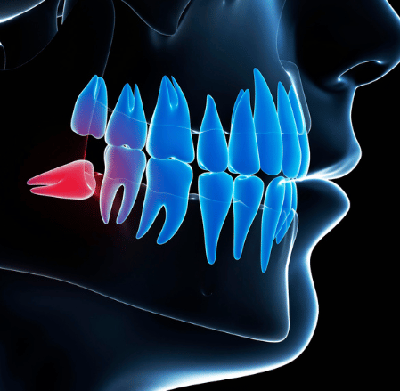How Can I Find an Emergency Dentist Near Me for Wisdom Teeth Removal?
I’ve been looking for an emergency dentist near me to manage a wisdom tooth that aches occasionally. I’m 32 and have all my wisdom teeth. Only one began to ache early last year. I had a wisdom teeth evaluation from an oral surgeon who says that three wisdom teeth are impacted, although I don’t have symptoms. The roots of one tooth are near a nerve, but the surgeon said nerve damage risk is low. He may leave the root. I’m not ready to have the teeth removed, though. All the dentists I called said they don’t do emergency wisdom teeth extraction. Can I wait until the tooth is really bothering me? I’m anxious and don’t want to sit through tooth extractions before I need them. I just need to find a dentist who will pull the wisdom teeth when I’m ready. – Thanks. Xander from IL
Xander,
As you age, wisdom teeth roots thicken, and your jawbone around them hardens. The longer you wait, the more challenging it is to remove wisdom teeth. The risks of complications or nerve damage increase as you age.
How Can You Find an Emergency Dentist Near You for Wisdom Teeth Removal?
You probably won’t find an emergency dentist near you willing to assume the risks of impacted wisdom teeth removal. Most general dentists will not remove impacted wisdom teeth. Also, a dentist would need to complete an evaluation of your wisdom teeth and review your digital X-rays to see the location of tooth roots near the nerves. The dentist would likely refer you to an oral surgeon.
What Can an Emergency Dentist Near Me Help With?
An emergency dentist near you can help if you have a toothache infection, trauma to a tooth, a broken tooth, or a lost dental restoration, such as a crown or filling. Scheduling an emergency visit with a dentist can prevent an infection from getting worse or save a traumatized tooth before it’s too late.
Removing Impacted Wisdom Teeth

An oral surgeon can anticipate the best way to remove your impacted wisdom teeth. Sometimes, a surgeon may dissect a tooth in pieces to make removal easier. We advise you to allow a surgeon to remove your wisdom teeth before they become problematic.
When a wisdom tooth’s root is near a nerve, a surgeon may wait until performing surgery to determine whether to leave the root or a root tip. Usually, leaving a small root tip in the socket does not present problems later.
Regarding your anxiety, a skilled oral surgeon will numb the surgical sites and remove all four wisdom teeth in minutes. Additionally, dentists and oral surgeons explain sedation options to relax you during dental procedures.
Dr. Thaddeus Michalski, a Rocky Hill, Connecticut dentist, sponsors this post.
How Can I Save My Loose Tooth?
Can an emergency dentist save my loose tooth, or do I need an oral surgeon? I tripped over a cement parking space block and fell face forward. That was two weeks ago, and now I’m starting to feel my left front tooth is loose. I chipped two other teeth, but they did not hurt. I was flossing two nights ago and thought the tooth was loose, but now, I am sure. My regular dentist is almost 45 minutes away, but I haven’t seen him in two years because of ongoing problems with a crown that he couldn’t resolve. Should I see an emergency dentist for this, or can I schedule my regular dentist to be referred to an oral surgeon? I hope I don’t need another crown because the one I got two years ago still gets sensitive sometimes when I chew on the left side of my mouth. Thank you. Evan

If your tooth is loose, you have a dental emergency. It is best to see your dentist, but if the distance is a problem, find a nearby experienced dentist who takes emergency cases.
How Can You Save a Loose Tooth?
Before treating a loose tooth, your dentist will examine it and take an X-ray. A dentist can stabilize the tooth by splinting or bonding it to adjacent teeth. Splinting or bonding will help tooth ligaments heal on their own. A dentist will also check your tooth for internal damage. If the tooth pulp is affected, after the ligaments heal, you will need root canal treatment to remove the dying tooth pulp. Root canal treatment will prevent infection and further problems with the tooth. The dentist will protect your tooth with a dental crown.
Until you see your dentist, take these precautions:
- Avoid chewing on the damaged tooth
- Do not touch it or wiggle it
- Do not floss between it
- Eat soft food
- Take anti-inflammatory medication to reduce swelling and promote healing
Healing will take a few weeks if your tooth ligaments are mildly damaged. More extensive damage can take months. You will have periodic checkups to ensure the healing is progressing well. Closely follow your dentist’s instructions for caring for your tooth after the dentist stabilizes it.
If your current dentist placed your crown last year, and you still have discomfort, consider consulting with a dentist with advanced occlusion and bite training. Preparing your tooth precisely and ensuring the crown fits well prevents sensitivity, discomfort, and potential TMJ symptoms. You can also ask the dentist to check your existing crown to determine why it is causing sensitivity.
Rocky Hill, Connecticut, cosmetic dentist Dr. Thaddeus Michalski sponsors this post. Read how he strives to provide patients with some of the best dental care in Rocky Hill.


